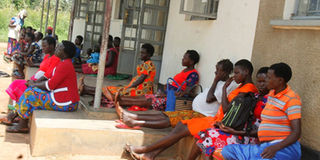Few personnel, absenteeism cripple Lira’s health services

Antenatal services. Expectant women wait to be attended to at Ongica Health Centre III in Lira District last week. Photo by Bill Oketch
What you need to know:
- In February this year, the Ministry of Health said it was upgrading health centre IIs and IIIs in the northern region in a phased manner. Upon completion, the facilities would be stocked with necessary equipment to ease work.
Inadequate personnel and staff absenteeism have crippled health services in Lira District, a survey conducted by Global Forum For Development (GLOFORD) Uganda, an NGO, in six selected health centres, has revealed.
The survey, which was done last week, showed that out of 298 health workers needed to run 16 government health centres across the district, there are only 249 personnel.
Rural areas are the most disadvantaged. For instance, Ogur Health Centre IV in Ogur Sub-county has been operating without a doctor for the last one year.
According to GLOFORD, the doctor left for further studies without informing the district authorities, and he was deleted off the payroll. The health facility has only 19 health workers out of 42.
Mr Morris Chris Ongom, the executive director of GLOFORD, said the rest of the health workers absconded from duty.
The facilities also have poor referral systems and face drug shortage.
Mr Edmond Aceka, the assistant district health officer, said absentee staff would be disciplined, adding that the health facilities would be supported to make timely request for drugs.
Eight staff houses were constructed at Ogur Health Centre but have been abandoned since staff prefer to commute.
Although the Health ministry installed a solar system in majority of the centres last month, it is too weak to supply power to run equipment in the laboratory and maternity during night emergencies. The solar system lights the maternity for only five hours.
At Abala Health Centre III in Agali Sub-county, hurricane lamps are used for lighting during night deliveries.
However, Mr Coxson Ameto, the officer-in-charge of the facility, said management should not be blamed for the poor services.
“Our people do not access quality services because drugs and health workers are few and the money we receive for running the facilities is inadequate. For instance, our allocation is only Shs11m per quarter,” he said.
Currently, there is no one to attend to expectant women at the facility because its two midwives are on maternity leave.
The health centre also lacks an antiretroviral treatment clinic yet there are 84 people in need of the services.
Residents travel more than 20 kilometres to Lira Regional Referral Hospital or Amach Health Centre IV for treatment.
At least 20 out of 520 people on the medication at the health facility no longer take it regularly.
“We are failing to follow up on people living with HIV who have defaulted on their treatment because of lack of transport,” Mr Richard Epenu, a nurse, said.
“When we go to a health centre, they take long to attend to us, sometimes we don’t find drugs or the health workers,” Mr Fred Ayena, a patient, said.
Ms Grace Ojobi, the officer-in-charge of maternity at Barapwo Health Centre III, said poor referral system and inadequate midwives has affected service delivery.
“Sometimes midwives use their money to transport emergency cases to Lira Regional Referral Hospital,” she said.
Mr George Okello Ayo, the district vice chairperson, said there are clear guidelines to deal with absentee health workers.
“If you don’t attend your duty for 15 days in a month, you are not supposed to be paid a salary,” he said.
Upgrade on
In February this year, the Ministry of Health said it was upgrading health centre IIs and IIIs in the northern region in a phased manner. Upon completion, the facilities would be stocked with necessary equipment to ease work.




